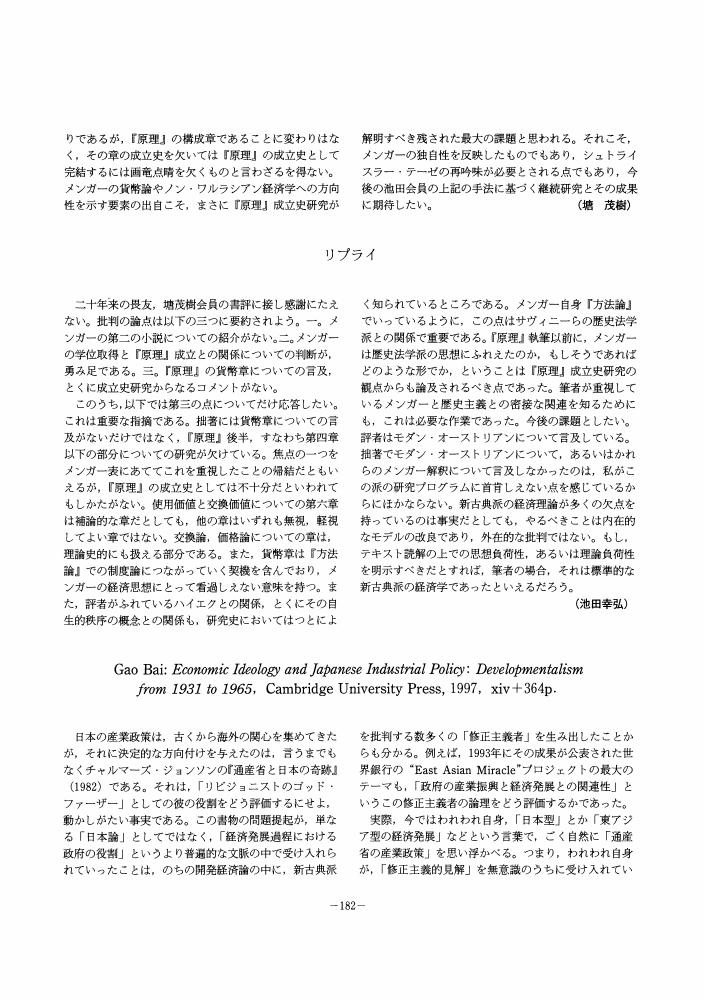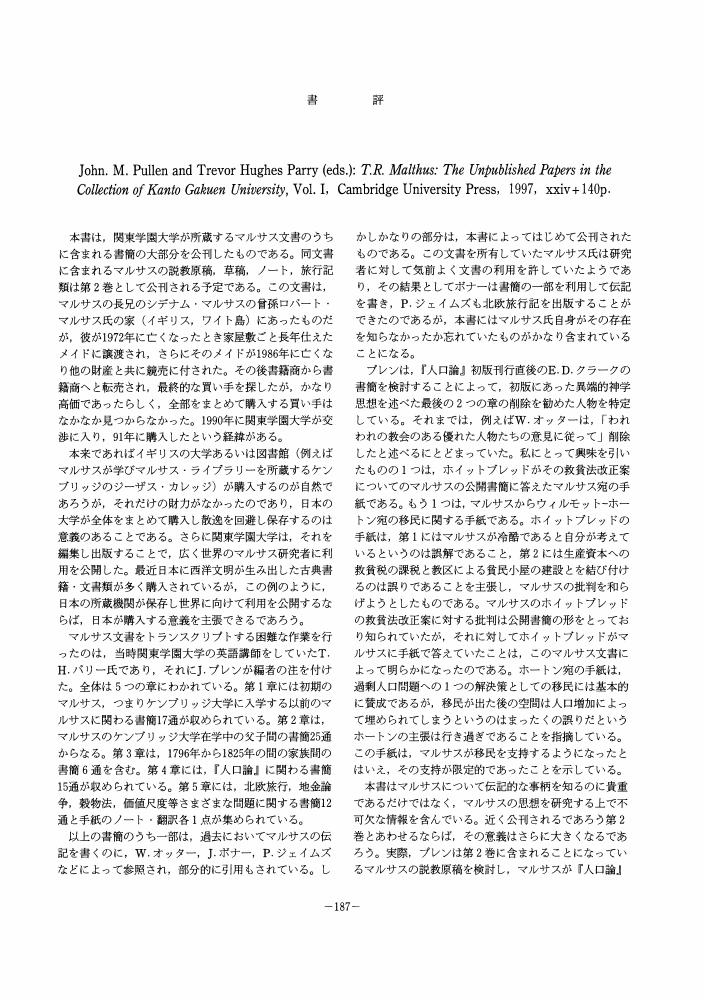- 著者
- 林田 治男
- 出版者
- The Japanese Society for the History of Economic Thought
- 雑誌
- 経済学史学会年報 (ISSN:04534786)
- 巻号頁・発行日
- vol.37, no.37, pp.196-197, 1999 (Released:2010-08-05)
1 0 0 0 OA 序 日本の経済学史研究と経済学史学会
- 著者
- 馬渡 尚憲
- 出版者
- The Japanese Society for the History of Economic Thought
- 雑誌
- 経済学史学会年報 (ISSN:04534786)
- 巻号頁・発行日
- vol.38, no.38, pp.1-5, 2000 (Released:2010-08-05)
The Japanese Society for the History of Economic Thought was founded in 1950, five years after World War II. Academic work in the field of economic thought was abundant before the war. The academic attainments in that area were guite high in the 1930s.The classical economics was introduced from the very beginning of the Meiji era. Under the Taisho democracy, via the foundation of the Japanese Society of Social Policy, there appeared two main streams of thought regarding the history of economic thought, the Marx-Kawakami and the Schumpeter-Fukuda schools of thought. Kawakami, pioneer of Marxian economics in Japan, wrote a book on the history of economic thought, which was the biginning of the Marxian type of history of economic thought. Schumpeter and Fukuda had a great influence on neoclassical type of research on the history of economic thought, having a strong effect, for example, on Yasui's works on Walras. As a result, in the 1930s, Japan experienced almost a world class level of research, including many general histories of economic thought. Although World War II interrupted and distorted the development in this field, the Japanese Society for the History of Economic Thought was founded successfully by the eminent historians who had worked in the 1930s.
1 0 0 0 OA わが経済学史研究の想い出
- 著者
- 飯田 鼎
- 出版者
- The Japanese Society for the History of Economic Thought
- 雑誌
- 経済学史学会年報 (ISSN:04534786)
- 巻号頁・発行日
- vol.38, no.38, pp.6-12, 2000 (Released:2010-08-05)
During the Second World War, the author began to study the theory of political economy, mainly as presented in the works of Adam Smith, David Ricardo and Thomas Robert Malthus. Afterwards, Iida was interested in the Historical School of Germany, because his study interest had gradually shifted to the study of social problems and Marxian doctrine, as Japan has been deeply influenced by the Historical School of Germany since the 1890s, the days of the Chino-Japanese War. The author's attention towards Japanese social problems was concentrated on the development of social policy theory and history as it was transplanted from Germany and other European countries.Since the 1970s, Iida has also been engaged in the study of Fukuzawa Yukichi, who was well known for his introduction of European civilization and economics to Japan. The author's intention is mainly to clarify the relationship between European economic theory and the modernization of Japan.
1 0 0 0 OA 『国富論』の学史的位置の相対化
- 著者
- 小林 昇
- 出版者
- The Japanese Society for the History of Economic Thought
- 雑誌
- 経済学史学会年報 (ISSN:04534786)
- 巻号頁・発行日
- vol.38, no.38, pp.13-20, 2000 (Released:2010-08-05)
This essay is a personal account of how an aspect of the post-1945 Japanese research in the history of economics has evolved, with emphasis on how I myself, through my own reading of Friedrich List, British Mercantilists, Josiah Tucker, and particularly James Steuart, as well as my discoveries of other noteworthy economic classics, unwittingly undermined, thus relativized, the dominant place commanded by one economic classic, Adam Smith, The Wealth of Nations. This was done within the prevailing academic atmosphere of the time, which was characterized by a predominance of Marxian orientation and a concentration on Adam Smith's studies since pre-1945 days, and a rather critical response to these two schools of thought. This post-WWII response, greatly facilitated by the Japan Society of History of Economics (established in 1950), contained some striking elements, such as the introduction of modern theories in the analysis of older economic treatises, Adam Smith studies being affected by expanded studies of the Scottish Enlightenment, and attempted new perceptions of the entire classical economics in view of the development of historical science and discoveries of various new materials, as well as conspicuous broadening of our horizon to include the Continental European and American scenes. In this process I gradually dissociated myself from the Marxian orientation in my reading of the history of economics.
- 著者
- 野口 旭
- 出版者
- The Japanese Society for the History of Economic Thought
- 雑誌
- 経済学史学会年報 (ISSN:04534786)
- 巻号頁・発行日
- vol.37, no.37, pp.182-183, 1999 (Released:2010-08-05)
- 著者
- 有江 大介
- 出版者
- The Japanese Society for the History of Economic Thought
- 雑誌
- 経済学史学会年報 (ISSN:04534786)
- 巻号頁・発行日
- vol.37, no.37, pp.183-184, 1999 (Released:2010-08-05)
- 著者
- 越智 良二
- 出版者
- The Japanese Society for the History of Economic Thought
- 雑誌
- 経済学史学会年報 (ISSN:04534786)
- 巻号頁・発行日
- vol.37, no.37, pp.184-185, 1999 (Released:2010-08-05)
- 著者
- 中村 廣治
- 出版者
- The Japanese Society for the History of Economic Thought
- 雑誌
- 経済学史学会年報 (ISSN:04534786)
- 巻号頁・発行日
- vol.37, no.37, pp.185-186, 1999 (Released:2010-08-05)
- 著者
- 渡会 勝義
- 出版者
- The Japanese Society for the History of Economic Thought
- 雑誌
- 経済学史学会年報 (ISSN:04534786)
- 巻号頁・発行日
- vol.37, no.37, pp.187-188, 1999 (Released:2010-08-05)
- 著者
- 田島 慶吾
- 出版者
- The Japanese Society for the History of Economic Thought
- 雑誌
- 経済学史学会年報 (ISSN:04534786)
- 巻号頁・発行日
- vol.37, no.37, pp.188-189, 1999 (Released:2010-08-05)
- 著者
- 若田部 昌澄
- 出版者
- The Japanese Society for the History of Economic Thought
- 雑誌
- 経済学史学会年報 (ISSN:04534786)
- 巻号頁・発行日
- vol.37, no.37, pp.189-190, 1999 (Released:2010-08-05)
- 著者
- 高橋 美弥子
- 出版者
- The Japanese Society for the History of Economic Thought
- 雑誌
- 経済学史学会年報 (ISSN:04534786)
- 巻号頁・発行日
- vol.37, no.37, pp.190-191, 1999 (Released:2010-08-05)
- 著者
- 竹永 進
- 出版者
- The Japanese Society for the History of Economic Thought
- 雑誌
- 経済学史学会年報 (ISSN:04534786)
- 巻号頁・発行日
- vol.37, no.37, pp.191-192, 1999 (Released:2010-08-05)
- 著者
- 深貝 保則
- 出版者
- The Japanese Society for the History of Economic Thought
- 雑誌
- 経済学史学会年報 (ISSN:04534786)
- 巻号頁・発行日
- vol.37, no.37, pp.192-193, 1999 (Released:2010-08-05)
- 出版者
- The Japanese Society for the History of Economic Thought
- 雑誌
- 経済学史学会年報 (ISSN:04534786)
- 巻号頁・発行日
- vol.37, no.37, pp.178-180, 1999 (Released:2010-08-05)
- 出版者
- The Japanese Society for the History of Economic Thought
- 雑誌
- 経済学史学会年報 (ISSN:04534786)
- 巻号頁・発行日
- vol.37, no.37, pp.180-182, 1999 (Released:2010-08-05)
1 0 0 0 OA マルサス『人口論』初版における農業重視論
- 著者
- 深貝 保則
- 出版者
- The Japanese Society for the History of Economic Thought
- 雑誌
- 経済学史学会年報 (ISSN:04534786)
- 巻号頁・発行日
- vol.37, no.37, pp.57-69, 1999 (Released:2010-08-05)
- 参考文献数
- 21
Most of the recent research on Malthus's agricultural bias has suggested that Malthus present this physiocratic idea in his first Essay on Population (1798). However, when considering Malthus's evaluation of agriculture, it is important to make distinctions among his physiocratic inclination, his agrarian or agricultural bias, and his protectionism of agriculture. This paper demonstrates that his agricultural bias in the first Essay was non-physiocratic.First, his explanation differing from the normal physiocrats' explanation of the surplus as the ‘clear rent’, Malthus grasped the ‘surplus’ uniquely. He explained that, when the landlords obtain food, they secure their own food first, then the remaining ‘surplus of food’ can be allotted to the labourers. Second, Malthus opposed the physiocratic meaning of the productive-unproductive distinction between agriculture and manufacture. The emergency of obtaining food under condition of scarcity is considered to be crucial. In the case of scarcity, even the non-profitable agriculture should be preferred to the manufacture, because only the former can provide food for the poor; the latter simply provides luxuries for the rich. Utilizing this explanation, Malthus estimated only the agricultural as useful and ‘productive’. Recent research has misinterpreted these unique ideas presented in the first Essay of Population.
1 0 0 0 OA 新古典派経済学の哲学的源流
- 著者
- 山本 英司
- 出版者
- The Japanese Society for the History of Economic Thought
- 雑誌
- 経済学史学会年報 (ISSN:04534786)
- 巻号頁・発行日
- vol.37, no.37, pp.70-81, 1999 (Released:2010-08-05)
- 参考文献数
- 27
Much criticism has been levied against Neo-Classical Economics (NCE). Currently, even the followers of NCE have declared the need for alternative economics.This paper examines the philosophical origins of NCE. In the process of making this examination, we establish a fundamental critique against NCE, which has survived through the ‘evolutionary’ process.This paper points out the philosophical origins of NCE. First, the theoretical aspect of NCE (that is, methodological individualism), originated in Descartes. ‘Homo Economicus’ (rational economic man) and the optimum principle are derived from Descartes. Notably, the logic of Descartes ultimately depends on the proof of the existence of God. This appropriation is scandalous, in that it throws into question the very rationality of Descartes' and Neo-Classical Economics' foundations. Second, the empirical aspect (i. e., falsificationism) originated in Popper. This appropriation gave the economics a scientific aspect, insist the followers of NCE. Although Kuhn's ‘Scientific Revolutions Theory’ and ‘Paradigm Theory’ challenged falsificationism, Popper's pupil Lakatos modified Popper's theory and advocated ‘Methodology of Scientific Research Programmes’ (MSRP). In turn, this modification made falsificationism seem innocuous.This paper ends with suggestions for alternative economics, referenced with irony from Descartes and Popper: Popper's original bold trials and errors (viz., conjectures and refutations), and Descartes' ‘temporary morality’.
1 0 0 0 OA アダム・スミス研究の動向
- 著者
- 田中 正司
- 出版者
- The Japanese Society for the History of Economic Thought
- 雑誌
- 経済学史学会年報 (ISSN:04534786)
- 巻号頁・発行日
- vol.37, no.37, pp.107-115, 1999 (Released:2010-08-05)
- 参考文献数
- 29
1 0 0 0 OA 市場社会論による経済社会構想
- 著者
- 杉浦 克己
- 出版者
- The Japanese Society for the History of Economic Thought
- 雑誌
- 経済学史学会年報 (ISSN:04534786)
- 巻号頁・発行日
- vol.37, no.37, pp.116-125, 1999 (Released:2010-08-05)
- 参考文献数
- 23














